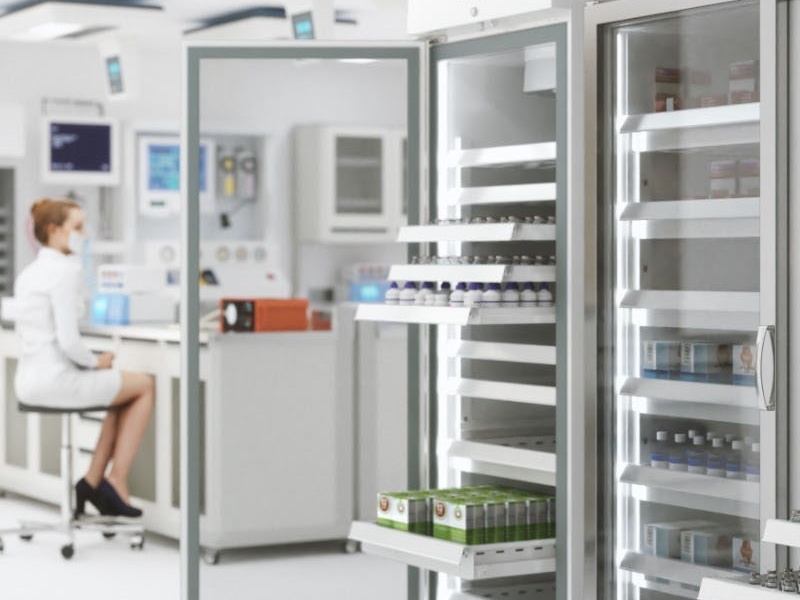Welcome to our new blog post. On this occasion we will talk about the characteristics and functions of a medical fridge.
At first glance it may seem identical, but there are many differences between a standard fridge and a medical one, especially for its features and functions.
Background information on medical fridge
People who work in the health sector will most likely need to use and administer medicines and vaccines as part of the daily work.
In the case of vaccines, they must be kept in the «cold chain» from the time they are manufactured until the moment they are administered to the patient.
This includes all transportation from the manufacturing laboratory to health or pharmaceutical facilities, and also during the time stored in the medical office before use.
The procedure makes it possible for the medicine or vaccine to stay at the required temperature to ensure it is suitable for patients.
Naturally, it is not possible to let medicines and vaccines be stored in standard fridges or be saved with personal items. It should be done in specific medical fridges.
Characteristics of a medical fridge
Precise control of the temperature
Most medicines and vaccines are stored within the 2Oc and 8Oc temperature ranges to maintain the cold chain during transport and storage.
This is such a narrow temperature range that it can only be maintained in medical fridges accurately and reliably.
To control temperatures, medical fridges can be equipped with state-of-the-art thermometers that record the temperature inside the vaccine, as well as in the refrigeration unit.
Standard refrigerators cannot provide such controlled temperatures, nor do their thermometers provide the precision levels offered by medical fridges.
Alarms warning if temperatures exceed range
Specific medical fridges come with alarms that ring if the temperature falls outside the required range. It is vital to ensure that vaccines don’t get damaged or spoilt.
These alarms allow health care professionals to respond instantly in the event that the temperature drops or rises above the required range and in this way, to take steps to protect medicines.
Although the cold chain may break and vaccines may remain safe, it is much better that they keep in the cold chain all times.
Glass door or solid door
Medical fridges come with extra equipment that can help health professionals in their work. One of these options is a glass door.
Glass-door refrigerators allow professionals to easily see the inside of the cabin and determine the level of vaccine and drug stocks.
It means that the refrigerator does not need to be opened unnecessarily, which helps to maintain the temperature range.
Medical refrigerators can also be purchased with a solid door that has the advantage of providing something more safety to prevent theft or breakage.
Extra security
Medicines and vaccines are expensive and they can be stolen. For this reason, this type of fridges comes with security measures, such as a lock to prevent unauthorized access.
Naturally, it not only prevents theft, it also ensures that the medical refrigerator will not be opened by accident.
Although a standard fridge and a medical one may seem similar at first glance, it is possible to realise that they are very different products and that vaccines will only be safe in a medical refrigerator.
Functions of a medical fridge
Laboratory refrigerators are used to cool samples for storage. They include refrigeration units for storing blood plasma as well as vaccines and other medical or pharmaceutical supplies.
They differ from standard refrigerators used in homes or restaurants, because they have to be completely hygienic and reliable.
Laboratory fridges must maintain a constant temperature to minimize the risk of bacterial contamination and volatile material explosions.
To achieve a high degree of accuracy, this type of refrigerator requires air circulation and a fan to maintain a uniform temperature all times. The fan is turned off when the door is open to prevent cold air from leaving the unit. Laboratory refrigerators have separate compartments to prevent cross-contamination and it gives the possibility to accommodate specific medical supplies, such as blood or vaccines.
Coreco friges: More than just a fridge
At Coreco we have designed an excellent range of refrigerators for laboratories of all types. Our devices have a storage capacity ranging from 70 to 2200 liters and with temperature ranges between +2 and +8 , also between -10 and -30 degrees Celsius.
We have all the quality certifications, approvals and national and international certifications in hygiene, electrical safety, electromagnetic and environmental compatibility. We have all the quality certifications, national and international approvals and certifications in standards of hygiene, electrical safety, electromagnetic and environmental compatibility. All the information is here.
It is possible to download our catalogue in this link and to contact us here.


 What is the importance of a laboratory fridge?
What is the importance of a laboratory fridge?